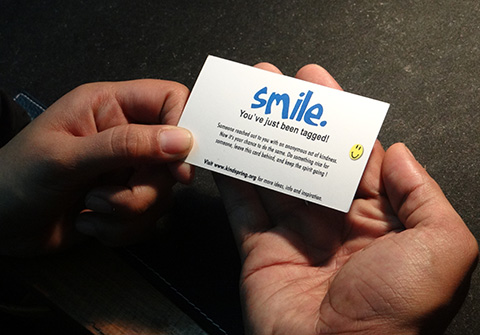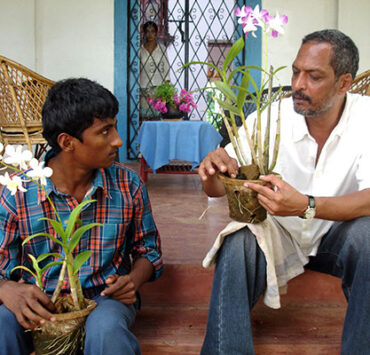When was the last time you gave somebody a gift? Was that somebody a friend or family member? Was the occasion a birthday or an anniversary? Or let’s consider the reverse case: when was the last time you received a present? Was it from someone close to you? And the occasion—was it your birthday, anniversary, or some other special day?
I am in the presence of someone who has posed the same set of questions to a hall full of people. My answers are similar to those offered by others seated around me. The last time I got presents was on my birthday, from my friends and family. My giving presents to people was a forced exercise, done only so that I could grab a slice of guilt-ridden chocolate cake. The man posing these questions—tall, fair, and excited—stands in front of the audience with a knowing smile, visibly happy in this simple room filled with common people. He is eager to tell a story.

All it took was a 20-minute-long talk for an unknown name, Nipun Mehta, to become an Internet phenomenon.
Two years ago, in 2012, this low-profile social entrepreneur achieved worldwide acclaim when the graduating batch of the University of Pennsylvania (UPenn) invited him to deliver their graduation speech. His speech, titled ‘Paths Are Made by Walking’, highlighted the lessons learnt during a pilgrimage on-foot that he undertook with his wife across rural India. Delivered in an unhurried manner, it got him a standing ovation from the newly-minted graduates of UPenn. All it took was a 20-minute-long talk for an unknown name, Nipun Mehta, to become an Internet phenomenon.
In 2005, after having established his social venture ServiceSpace, a newly-wed Nipun Mehta, along with his wife, decided to leave everything behind and take a leap of faith into a world without materialism. In pursuit of what would seem like an outlandish goal to most people, the Mehtas sold all their possessions and flew to India. Between the two of them, they budgeted a dollar a day, mostly for incidental costs—which meant that they had to depend entirely on the kindness of strangers for their survival. Over the next six months, they ate whatever food was offered to them and slept wherever they were offered space. The experience deeply affected them—the kindness of strangers overwhelmed them on various occasions. Mehta recounts, “We walked at the peak of summer, in merciless temperatures hovering above 45 °C. We were hungry, exhausted, and frustrated. Our bodies ached for an extra glass of water, a few more moments in the shade, or just that little spark of human kindness. Many times we received that extra bit, and our hearts would overflow with gratitude. But sometimes we were abruptly refused, and we had to cultivate a capacity to accept the gifts hidden in even the most challenging of moments.”
There are just over fifty people in the hall, belonging to a range of ages and vocations: social workers, entrepreneurs, students, teachers, and professionals, and they are all enraptured by the benevolence evident in Mehta’s soft voice. With his white kurta-pajama, apparent spiritual inclination, and warm persona, Mehta could easily pass for a godman, but he chooses not to. He identifies himself as a social entrepreneur, with one significant difference—he doesn’t trade in money, but in kindness. In the last ten years, he has not once worked for money. “According to the I.R.S., I’m definitely poor, but anyone who knows me will tell you that I live like a king,” he chuckles.
Mehta, after his journey, returned to the U.S. and resumed ServiceSpace, which has now turned into an incubator for gift-economy projects, with him as its Chief Inspiration Officer. ServiceSpace has pioneered the idea of gifting to promote joy and well-being, even giving birth to Karma Kitchen, a one-of-a-kind restaurant in the U.S., and subsequently inspiring the Seva Cafés in India. Imagine going to a restaurant where, after eating your fill, you receive a bill for zero rupees. The bill is accompanied by a Smile Card that says you have been tagged by someone who has already paid for your meal. The Smile Card gives you a chance to carry this anonymous act of kindness forward, and sponsor a meal for the next person who comes in to the café, thus growing the chain of kindness. Mehta says, “During our pilgrimage, extremely poor villagers, who couldn’t even afford their own meals, would often borrow food from their neighbours to feed us. These people knew how to give, not because they had a lot, but because they knew how to love life. They didn’t need any credit or assurance that you would ever return to pay them back. Rather, they just trusted in the pay-it-forward circle of giving. This trust is what sustains this generosity.” This is how the gift economy functions—if at any point people decide not to give, the system crumbles within a matter of minutes.

Pay it forward. Photograph by Farakh Abbas.
A computer science and philosophy major from Berkeley, Mehta worked for a year with Sun Microsystems before getting disenchanted with the greed that came about with the dot-com boom of the ’90s. It was this lust for money in the industry that repelled him from computer science and brought him closer to his other major, philosophy. His family thought he was crazy when he left his job to pursue an uncertain path towards becoming “a better person”. He says, “I reached a sort of a compromise with my parents. They wanted me to be able to sustain myself doing whatever. I agreed to their demands. But since they didn’t elaborate on the word ‘sustain’, I changed my way of living in such a way that I wouldn’t need anything more than the very basic amenities.” The parents in the audience laugh along with him.
Mehta was in India for three months recently, and it is during his three-day stint in New Delhi that this talk on ‘giftivism’—the practice of propagating radically generous acts that can change the world—takes place. Through inspiring stories, he elucidates how giftivism can instigate shifts from consumption to contribution, transaction to trust, isolation to community, and scarcity to abundance. He recalls, “I met a lady in Bengaluru who, after reading my UPenn lecture, decided to serve tea to morning walkers in a nearby park. Initially, people seemed skeptical and didn’t take her tea, but she won them over with her warmth and love. The next week, a few other walkers joined in and started serving water and biscuits as well, covering a wider audience.” Employing the subtle technique of show-not-tell, he makes the audience see for themselves how the aforementioned shifts played out, transcending paradigms. In a country where most such ‘awakened’ individuals turn into self-proclaimed gurus and begin monetising their knowledge, it’s a welcome change to see Mehta sharing his ideas so generously. When the talk ends, the crowd not only stands up, but also jumps forward to hug Mehta, as if they have been devoid of such genuine and heartfelt gestures here in Delhi. Meanwhile, thousands of Smile Cards are distributed among the audience members, who are eager to get their hands on as many as possible. These little cards of kindness are soon to make their rounds of the capital.
Keep your eyes open, for one of these days, you might just receive a surprise tagged with a Smile Card. It feels great when you receive gifts, doesn’t it? Perhaps more importantly, it feels just as good to give them as well. How about paying for someone’s next cup of coffee? Or gifting an anonymous pack of chocolates to your next door neighbour? Or cooking for your maid for a day? Or just offering a hug and a heartfelt thank-you to a person you encounter every day—maybe the nightwatchman who forsakes his sleep to assure your safety?
You don’t need a Smile Card to make someone smile. Let’s spread some warmth this summer.








